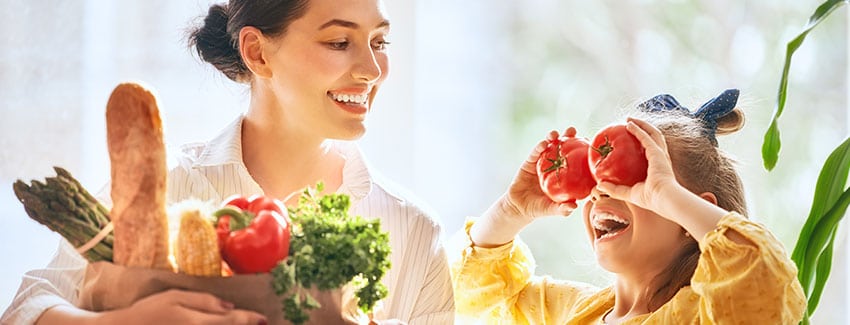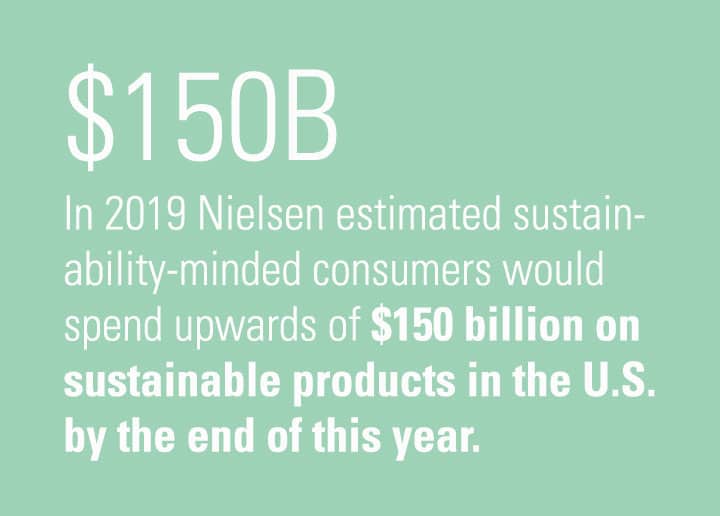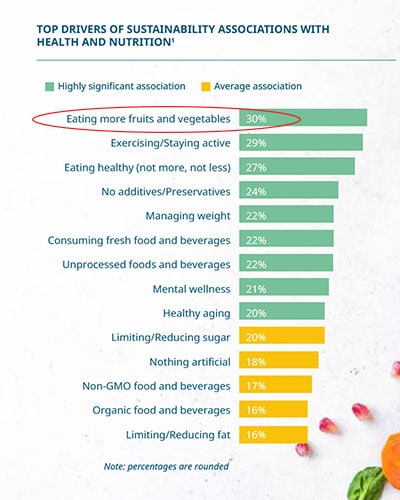
I’m delighted to see sustainability coming to the forefront in our industry rather than remaining an afterthought. Frankly, it’s been a long time coming. In its recently released Sustainability in Motion white paper, global ingredient supplier, Kerry says sustainability “has moved from an emerging trend to a mainstay table stake.” In fact according to market research firm, Innova, 75% of global consumers expect companies to invest in sustainability. Also Kerry reported nearly half of global consumers prioritize sustainability at various levels. These heightened consumer expectations are what’s making sustainability a priority for companies. It’s no surprise corporate sustainability concerns are linked to consumer attitudes.

It’s basic economics. Consumers (who are employees too) are driving change with their buying power. In 2019 Nielsen estimated sustainability-minded consumers would spend upwards of $150 billion on sustainable products in the U.S. by the end of this year. Further evidence is seen in the 57% average annual growth rate of global food and beverage launches carrying an environmental/ethical claim, reported by Innova looking at data from 2013 to 2017.
The Kerry report digs below the surface to look at the reasons sustainability is gaining global importance and makes the case for why it’s a must-have for successful companies in the future. Addressing sustainability gives food and beverage manufacturers another way to connect with consumers and an opportunity to build customer loyalty. In North America, 62% of consumers told researchers they are strongly influenced by sustainability when they buy food and beverages at a grocery outlet. Similarly, 58% were strongly influenced by sustainability when selecting items in a restaurant.
What’s sustainability anyway?
Interestingly, in consumers’ minds sustainability has moved beyond recyclable packaging and the general notion of being environmentally friendly to a broader range of concerns that cover environmental, social, industrial, and personal priorities. These include ingredient sourcing, farmer welfare, animal welfare, food waste, atmosphere preservation, food production methods, and health and nutrition.
The Kerry researchers found that consumers fall into four distinct archetypes along what they call a ‘sustainability adoption curve.’
The archetypes:
- Inactives
- Passives
- Followers
- Frontrunners
The archetype names aptly describe the level of sustainability involvement each group embraces. For people at the beginning of the ‘sustainability adoption curve,’ sustainability is extrinsic to them – important but not a key driver. As people move up the curve, their sustainability impact becomes more intrinsic or individual to them.

Healthy me/healthy planet
One of the insights I found most revealing in the Kerry report was among consumers’ associations with sustainability.
Nearly three in four North American consumers said they associate health and nutrition with sustainability.
“The definition of sustainability is evolving with consumers now blurring the lines between sustainability and health and nutrition,” noted the researchers.
Taking it one step further, consumers’ drivers of sustainability associations with health and nutrition were examined. Topping the list was “eating more fruits and vegetables,” which was reported as a ‘highly significant association.’ Other significant associations were tied to exercise and eating a generally healthy diet.
This means people are not only making the connection between what they eat and their overall health, but they’re making a further link that their food choices impact the health of the planet. To me, this seems momentous. As a longtime observer of consumer behavior, I realize people often say one thing and do another. Yet I still think this is significant.
If you want to read more details about this global sustainability research, check out the Kerry white paper.
Sustainability pioneer
For us at Tree Top, sustainability is never far away. It’s at our core – it’s the reason our company came into being. Tree Top was established in 1960 as a grower-owned agricultural cooperative to save excess, ugly fruit that wasn’t acceptable for the fresh market from going into landfill. Our founding growers didn’t want to see healthful fruit go to waste.
Today Tree Top has a formal sustainability program to monitor our impact on the environment. We track and report our energy, water, and carbon emissions, among other activities as part of our commitment to minimizing the impact of our business on the environment and our community. We invite you to read our Corporate Social Responsibility Report.





